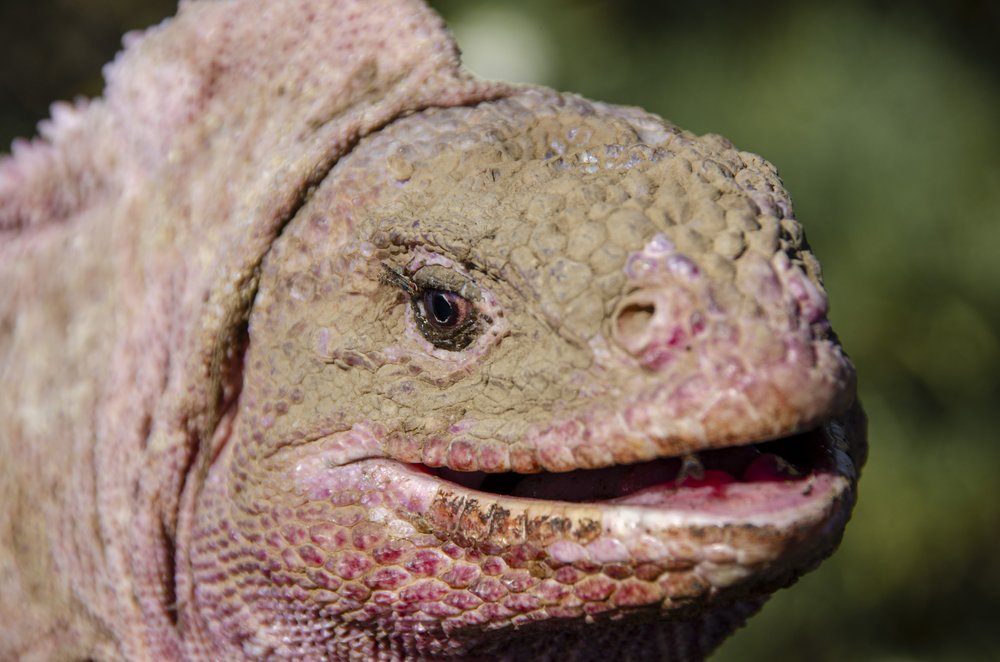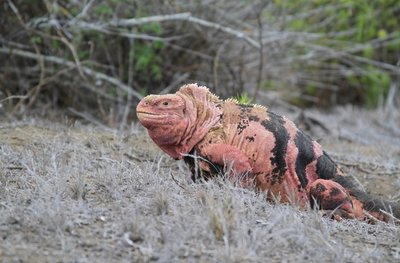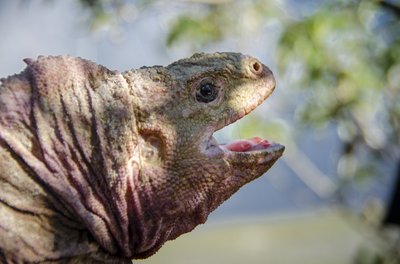Scientists Discover a Novel Herpesvirus in the Critically Endangered Galapagos Pink Land Iguana
A groundbreaking study, led by a multi-disciplinary team of researchers in collaboration with the Charles Darwin Foundation (CDF), has identified a novel herpesvirus in the critically endangered Galapagos pink land iguana, Conolophus marthae. This finding marks the first documentation of a herpesvirus in iguanas of the Galapagos Islands, potentially prompting important considerations for the conservation of one of the world's most endangered iguana species, which will need further study.
The multi-institutional research team, including Ainoa Nieto-Claudín, Carlos Sacristán, Sharon L. Deem, Gregory A. Lewbart, Giuliano Colosimo, Fernando Esperón, Christian Sevilla, and Gabriele Gentile, conducted a comprehensive health assessment on both the critically endangered Galapagos pink land iguana and the vulnerable Galapagos land iguana (Conolophus subcristatus). Oral and cloacal swabs were collected from 47 clinically healthy iguanas, with two out of 38 (5.3%) Galapagos pink land iguanas testing positive for herpesvirus.

Herpesviruses are a type of virus that can infect many different animals, including humans. The virus may or may not cause symptoms, which usually appear when the immune system of their host is down.
The herpesviral sequences discovered in the Galapagos pink land iguanas were not only identical but also exhibited a significant divergence (61.9% amino acid identity) when compared to the closest herpesvirus sequences available in GenBank/EMBL/DDBJ. This genetic distinction places the virus in a classification as a novel species, emphasizing the need for further research to understand its implications.


“The strong genetic divergence from herpesvirus already known from Galapagos tortoises would suggest a coevolutionary relationship between the virus and its host, similar to what has been already observed between hemogregarine hemoparasite (a type of blood parasite) and Galapagos iguanas. This process could lead to coadaptation, which would be consistent with the fact that we never observed symptoms in iguanas, always found in good health over 20 years of investigation,” said Gabriele Gentile, senior author of the study and Professor of Zoology at the University of Rome Tor Vergata.
Ainoa Nieto, lead author of the research paper, Associate Researcher of the Saint Louis Zoo Institute for Conservation Medicine and CDF, added: “This groundbreaking discovery raises questions about the potential impact of the novel herpesvirus on the health and conservation of the iconic Galapagos pink land iguana. It also suggests that surveys aimed at testing the presence of the virus should be included in health-oriented protocols for iguanas, especially in those that will be selected for captive or head-start management purposes. As the first report of a herpesvirus for this critically endangered species, the findings underscore the importance of ongoing research to further understand its potential impact on pink iguanas and inform conservation and management strategies for the Galapagos Islands' unique and vulnerable wildlife.”
For Christian Sevilla, technician at the Galapagos National Park Directorate, "continuing the study is crucial to determine if this strain is endemic. It's important to note that the populations of Galapagos land iguanas maintain healthy population structures, so there's no evidence to suggest that this virus has impacted their health.”
To read the full findings of the paper please visit 10.1016/j.actatropica.2024.107127
For media, please contact:
Charles Darwin Foundation
Ambre Tanty-Lamothe / Leslie León
comunicacion@fcdarwin.org.ec
Galapagos National Park Directorate
Rosa León, Information officer
rleon@galapagos.gob.ec | +593 96 985 4231
About the Charles Darwin Foundation
Since 1959, the Charles Darwin Foundation has worked in close partnership with the Galápagos National Park Directorate to protect the Islands’ natural resources and share scientific results for the conservation of this living laboratory. More than one hundred scientists, educators, researchers, support personnel and volunteers from all over the world have participated in this effort. Currently, more than 75% of the staff are Ecuadorian citizens. The Charles Darwin Foundation is committed to the professional development of permanent Galápagos residents as future scientists, for the well-being of the islands and the nation in general. For more information visit: www.darwinfoundation.org





